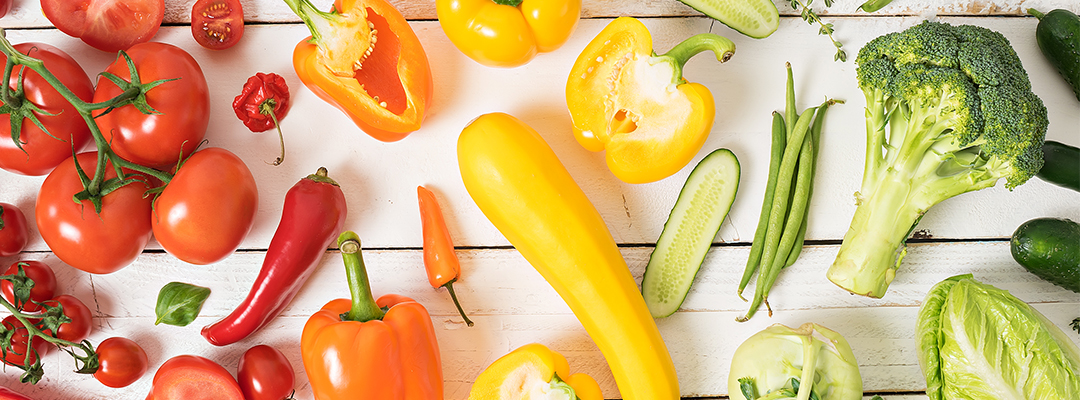
Whether it’s a friend, family member or yourself, nearly everyone knows someone who has been impacted by cancer. In honor of October being National Breast Cancer Awareness Month, we are teaming up with our nutrition partner, Good Measure Meals, to shed some light on how our eating habits and other lifestyle choices affect our risk.
There are a number of factors, both within and outside our control, that affect our risk of getting cancer. No single food or nutrient can prevent or cure cancer. That said, there are food choices we can make and other health-related behaviors we can take to lower our risk.
Plant Power
When it comes to nutrition, your best defense against cancer is to eat a variety of colorful fruits and vegetables. Fruits and veggies are naturally rich in protective plant compounds called antioxidants. Antioxidants protect cells and DNA by neutralizing free radicals that would otherwise damage them, possibly leading to cancer. Free radicals are produced in our bodies constantly through environmental exposure, metabolism and vigorous exercise. In fact, for runners and other athletes who are constantly stressing their bodies, consuming enough antioxidants is even more important to stay strong, healthy and cancer-free.

Eat the Rainbow
Each of the colors found in fruits and vegetables is actually a different antioxidant with a unique, protective effect. Aim to consume produce from a variety of color groups throughout the week to reap all the health benefits.
- RED fruits and veggies contain a number of antioxidants including vitamin C and lycopene, the latter of which is especially known to decrease prostate cancer risk and may be protective against breast cancer as well. As a fat-soluble nutrient, lycopene is best absorbed in cooked form and when paired with a heart-healthy fat like olive oil or avocado.
- ORANGE/YELLOW pigmented fruits and veggies owe their color to the carotenoid antioxidant beta-carotene, a precursor to vitamin A.
- GREEN veggies are high in vitamins A, C, E and K, folate, and carotenoid antioxidants. For optimal health and cancer protection, include green veggies with as many meals as possible.
- BLUE/PURPLE fruits and veggies are rich in a powerful class of antioxidants called anthocyanins, which are protective against cancer and a number of other diseases.
- WHITE foods get a bad rap, but they’re actually a potent source of flavonoid antioxidants called anthoxanthins.

Focus on Fiber
Dietary fiber is associated with decreased risk of many forms of cancer, particularly colon cancer. Luckily, the same foods that are packed with antioxidants also tend to be great sources of fiber. In addition to fruits and veggies, make sure to include other naturally fiber-rich plant-based foods such as whole grains, beans, legumes, and nuts. Women should aim for 25 grams, and men 38 grams, of fiber per day, ideally through whole foods.
Foods to Decrease
While we prefer to focus on what to eat more of, and it’s certainly important to incorporate more colorful, fiber-rich plant-based foods, there are also some foods to eat less of in order to decrease cancer risk. High intakes of processed meats, such as sausage, bacon and hot dogs, snack foods high in refined grains and saturated fat, like chips, cookies and pastries, and soft drinks and other sweetened beverages, are associated with increased cancer risk. These foods are best treated as treats and consumed in moderation.
Other Lifestyle Factors:
Beyond nutrition, there are several other modifiable factors within your control that can impact health and lower cancer risk.
- Regularly Exercise
- Maintain a Healthy Weight
- Quit Smoking
- Limit Alcohol
The Take-Away
There is no single food that causes cancer, nor one that will cure or prevent it. But taking care of your personal health by eating a plant-rich diet, exercising regularly and practicing other healthy habits can lower your risk.
For more support in making healthy food choices and positive lifestyle changes, Good Measure Meals offers a full range of resources, from ready-to-eat fresh meal plans to individual nutrition counseling. Check out their website to learn more about available services, and their blog for healthy recipes, insights, and inspiration.

Alissa Palladino, MS, RDN, LD, ACSM-CPT
Alissa is a Registered Dietitian at Good Measure Meals where she helps people achieve and maintain their health goals. A veggie lover and avid runner with a number of half and full marathons under her belt, she believes the best form of exercise is the one you enjoy and the best nutrition plan is one that fits into your lifestyle.
Published: October 2018
